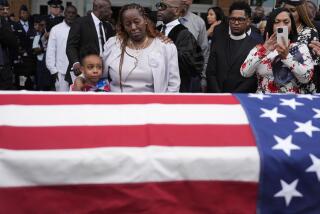Wife of Dead Pilot Urges Rejection of Guard Chief
- Share via
SACRAMENTO — The wife of an Air National Guardsman killed in the crash of a jet fighter told a legislative committee Wednesday that an unfavorable investigation into his death had been covered up and appealed to lawmakers to deny confirmation of the guard’s new commander.
Mrs. Toni Jordan, 33, widow of Major John Jordan Jr., asserted that under Brig. Gen. Robert Thrasher, who was appointed adjutant general of the California National Guard a year ago, the state Military Department ignored recommendations that might have averted the crash.
Thrasher, an up-from-ranks guardsman who enlisted 30 years ago, told reporters after the hearing: “I know of no cover-up. If I knew of any cover-up, I would certainly take action.” The accusations came after his opening statement and he did not have a chance to rebut them during the hearing.
Postpone Action
The state Senate Rules Committee, which also heard a deluge of criticism of Thrasher from retired guard generals, as well as praise from a phalanx of Thrasher supporters, postponed action for two weeks while it sorts out the charges and countercharges.
Thrasher became the second appointment of Gov. George Deukmejian’s to be delayed by the committee in recent days. Last week, the committee postponed a vote on the appointment of former guard commander Willard A. Shank to the state Unemployment Insurance Appeals Board.
Ordinarily, confirmation of a National Guard commander is a routine affair, largely because the state Military Department is financed almost entirely by the federal government and receives scant attention from the Legislature.
But the extraordinary, four-hour hearing Wednesday on Thrasher’s confirmation played to a standing-room-only crowd that included military officials from Washington and a platoon of ribbon-bedecked generals and colonels in full uniform.
Urges Investigation
Toni Jordan, who testified that she had been rebuffed by the military in her eight-month effort to learn the circumstances of her husband’s death in the crash of an A4 Phantom jet last June in the Arizona desert, urged the committee to deny Thrasher’s confirmation and make a “full-scale investigation” of the National Guard.
Maj. Jordan, 39, was a weapons systems officer aboard the jet, which was flown by Capt. Wesley Deane, 27, of Modesto. Both fliers were assigned to the 144th Fighter Interceptor Wing at Fresno when the crash occurred during a low altitude maneuver.
Toni Jordan testified that despite her efforts to learn from the guard the circumstances of the crash, it was not until she read a news story in August that she found out that a guard investigation found that the pilot was unqualified to fly the mission and that his flight records had been falsified.
Subsequently, she received an “unsanitized” version of the report which confirmed the news account, she said.
“Since the death of my husband, I feel as though I am a second-class citizen, not deserving of common courtesy and rights,” she said.
Charges Cover-Up
She charged that allegations of mismanagement and safety violations at the Fresno Air National Guard unit were covered up by the Air Force and National Guard in 1986 and that if remedial action had been implemented the fatal flight of her husband and Deane might not have occurred.
“Had the authorities acted to change those circumstances, instead of covering them up, my husband and Capt. Deane would have been alive today,” Jordan told the committee. “In 1986, Gen. Thrasher was second in command of the California National Guard and at the time of the accident was first in command.”
Various guard officers and Dennis Kenneally, deputy assistant secretary of the Air Force for reserve affairs, told the committee that under the military’s strict system of confidentiality even Thrasher and other California guard officers are not told the precise details of an airplane crash investigation.
Brig. Gen. John McMerty, deputy director of the Air National Guard in Washington, and others explained that for investigators to receive objective and accurate information they must be able to guarantee confidentiality to their informants. The information gathered is aimed at preventing future accidents, he said.
Acknowledges Problem
McMerty conceded that there was a major gap between protection of confidential information and “how far should we reasonably go to meet our human responsibilities” to the surviving families.
At the outset of his testimony, McMerty turned toward Jordan and made a “public apology” to her, adding that “I recognize that doesn’t offer much solace.”
More to Read
Get the L.A. Times Politics newsletter
Deeply reported insights into legislation, politics and policy from Sacramento, Washington and beyond. In your inbox twice per week.
You may occasionally receive promotional content from the Los Angeles Times.










